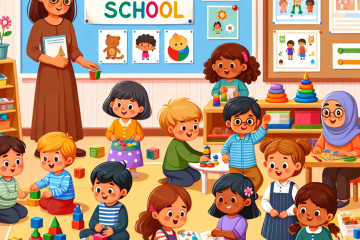Different Childhood Education Systems for Optimal Development
Early childhood education (ECE) serves as the foundation upon which future academic and personal success is built. Research has consistently shown that high-quality ECE programs significantly impact a child’s cognitive, social, and emotional development. In this article, we will explore the top 3 early childhood education systems globally recognized for fostering optimal developmental outcomes.
The Importance of Early Childhood Education
Early years are crucial as they are the formative period during which a child’s brain development is at its peak. Effective ECE programs can:
- Enhance Cognitive Abilities: Pre-kindergarten programs help children develop essential skills such as language, numeracy, and problem-solving.
- Boost Social Skills: Guided peer interaction in ECE settings promotes empathy, cooperation, and communication.
- Emotional Development: Early learning environments provide emotional support and help children develop self-regulation skills.
- Future Success: Children who participate in high-quality ECE are more likely to excel academically and socially later in life.
Given these critical benefits, let’s look at the top three early childhood education systems that have demonstrated excellence.
1. Finland’s Play-Based Approach
Overview
Finland is renowned for its exceptional education system, including its approach to early childhood education. Finnish ECE emphasizes a play-based curriculum that nurtures a child’s natural curiosity and creativity.
Key Features
- Holistic Development: Emphasizes overall well-being over academic achievement, focusing on developing a love for learning.
- Highly Trained Educators: Teachers undergo rigorous training and continuous professional development.
- Individualized Learning: Personalized learning plans to meet individual needs and interests.
- Minimal Testing: Reduced emphasis on standardized testing encourages exploration and discovery through play.
Impact
Finnish children typically enter formal schooling at age seven, but their early years are filled with enriched environments that foster cognitive, social, and emotional skills. Studies show that this approach reduces stress and improves overall happiness and well-being among children.
2. Reggio Emilia Approach in Italy
Overview
Originating in Italy, the Reggio Emilia approach is a child-centered and constructivist philosophy of ECE. Known for its emphasis on project-based learning, this system encourages children to explore complex ideas through interactive, hands-on projects.
Key Features
- Collaborative Learning: Children, teachers, and parents work together as co-learners and co-researchers.
- Environment as the Third Teacher: Classrooms are designed to be welcoming and stimulating learning environments.
- Emphasis on Documentation: Children’s work, progress, and experiences are carefully documented and revisited.
- Project-Based: Long-term projects allow in-depth exploration of topics chosen by children.
Impact
The Reggio Emilia approach promotes critical thinking, problem-solving, and a sense of ownership over learning. Children who experience this method often exhibit higher levels of motivation and creativity.
3. Singapore’s Structured Curriculum
Overview
Singapore’s ECE system is globally recognized for its structured curriculum and strong emphasis on both academic and socio-emotional development. The country has made substantial investments to ensure that early childhood programs meet high standards of quality and inclusivity.
Key Features
- Integrated Curriculum: Combines academic rigor with activities that promote emotional and social growth.
- Qualified Staff: Teachers are held to high standards and receive continual training.
- Play-Based Learning: Incorporates elements of play to sustain interest and engagement.
- Parental Involvement: Strong partnerships with families to support children’s learning and development.
Impact
Singaporean children typically score high on international assessments due to the solid foundation established by their ECE system. More importantly, the system ensures that children develop socially and emotionally, preparing them for lifelong learning.
Conclusion
In conclusion, the importance of early childhood education cannot be overstated. By looking at the top systems in Finland, Italy, and Singapore, we see a common thread: a balanced focus on holistic development, qualified educators, and engaging, child-centered learning environments. Each of these systems offers invaluable lessons in how we can support optimal development in our youngest learners.
For the best early childhood education, consider the unique strengths of these top educational systems and the ways they can be integrated into local contexts. Investing in high-quality ECE today sets the stage for a brighter, more successful tomorrow.




